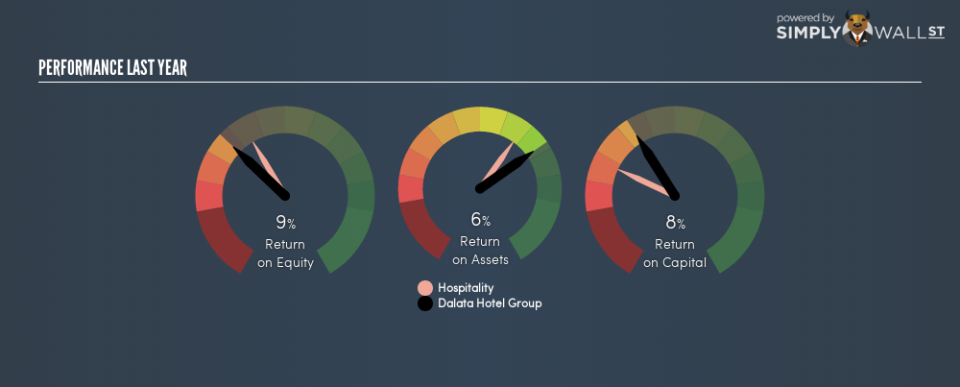Does Dalata Hotel Group plc (ISE:DHG) Create Value For Shareholders?

Want to participate in a short research study? Help shape the future of investing tools and you could win a $250 gift card!
Today we are going to look at Dalata Hotel Group plc (ISE:DHG) to see whether it might be an attractive investment prospect. In particular, we’ll consider its Return On Capital Employed (ROCE), as that can give us insight into how profitably the company is able to employ capital in its business.
First of all, we’ll work out how to calculate ROCE. Then we’ll compare its ROCE to similar companies. Then we’ll determine how its current liabilities are affecting its ROCE.
Understanding Return On Capital Employed (ROCE)
ROCE is a metric for evaluating how much pre-tax income (in percentage terms) a company earns on the capital invested in its business. In general, businesses with a higher ROCE are usually better quality. Ultimately, it is a useful but imperfect metric. Renowned investment researcher Michael Mauboussin has suggested that a high ROCE can indicate that ‘one dollar invested in the company generates value of more than one dollar’.
So, How Do We Calculate ROCE?
Analysts use this formula to calculate return on capital employed:
Return on Capital Employed = Earnings Before Interest and Tax (EBIT) ÷ (Total Assets – Current Liabilities)
Or for Dalata Hotel Group:
0.081 = €89m ÷ (€1.2b – €92m) (Based on the trailing twelve months to June 2018.)
Therefore, Dalata Hotel Group has an ROCE of 8.1%.
Check out our latest analysis for Dalata Hotel Group
Is Dalata Hotel Group’s ROCE Good?
ROCE can be useful when making comparisons, such as between similar companies. We can see Dalata Hotel Group’s ROCE is around the 8.4% average reported by the Hospitality industry. Setting aside the industry comparison for now, Dalata Hotel Group’s ROCE is mediocre in absolute terms, considering the risk of investing in stocks versus the safety of a bank account. Investors may wish to consider higher-performing investments.
In our analysis, Dalata Hotel Group’s ROCE appears to be 8.1%, compared to 3 years ago, when its ROCE was 4.2%. This makes us wonder if the company is improving.
It is important to remember that ROCE shows past performance, and is not necessarily predictive. Companies in cyclical industries can be difficult to understand using ROCE, as returns typically look high during boom times, and low during busts. ROCE is, after all, simply a snap shot of a single year. Since the future is so important for investors, you should check out our free report on analyst forecasts for Dalata Hotel Group.
How Dalata Hotel Group’s Current Liabilities Impact Its ROCE
Short term (or current) liabilities, are things like supplier invoices, overdrafts, or tax bills that need to be paid within 12 months. Due to the way ROCE is calculated, a high level of current liabilities makes a company look as though it has less capital employed, and thus can (sometimes unfairly) boost the ROCE. To counter this, investors can check if a company has high current liabilities relative to total assets.
Dalata Hotel Group has total liabilities of €92m and total assets of €1.2b. As a result, its current liabilities are equal to approximately 7.4% of its total assets. With low levels of current liabilities, at least Dalata Hotel Group’s mediocre ROCE is not unduly boosted.
What We Can Learn From Dalata Hotel Group’s ROCE
If performance improves, then Dalata Hotel Group may be an OK investment, especially at the right valuation. But note: Dalata Hotel Group may not be the best stock to buy. So take a peek at this free list of interesting companies with strong recent earnings growth (and a P/E ratio below 20).
If you like to buy stocks alongside management, then you might just love this free list of companies. (Hint: insiders have been buying them).
To help readers see past the short term volatility of the financial market, we aim to bring you a long-term focused research analysis purely driven by fundamental data. Note that our analysis does not factor in the latest price-sensitive company announcements.
The author is an independent contributor and at the time of publication had no position in the stocks mentioned. For errors that warrant correction please contact the editor at editorial-team@simplywallst.com.

